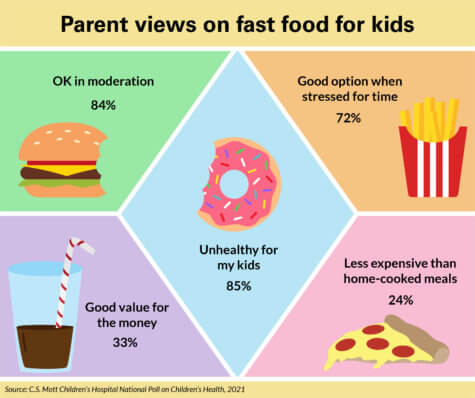ANN ARBOR, Mich. — Eating at home more frequently as a result of COVID-19 restrictions and concerns might lead one to believe children are eating healthier, but new research challenges that conclusion. According to a survey, one in five parents say their kids have been snacking away on more junk food since the start of the pandemic.
Although many moms and dads say their family has enjoyed healthier meals since the onset of coronavirus, 20% admit being “too stressed” to cook. And one in six say their child consumes fast-food at least twice a week. The survey of more than 2,000 parents of American children aged 3 to 18 was conducted by researchers at the University of Michigan Health C.S. Mott Children’s Hospital.
“The pandemic disrupted many family routines, including where and what they eat. We know families’ lifestyles can impact children’s diets, and we looked to see how the pandemic may have changed their eating habits,” explains Dr. Gary Freed, poll co-director and Mott pediatrician, in a statement. He says that families’ views on fast-food consumption varied based on the parents’ perceptions of their child’s weight.
“Parents who said their kids are overweight were almost twice as likely to say their children have fast-food at least twice a week, compared to those who said their kids are at a normal weight. Parents also identified some barriers to home-cooked meals. Around 40% of parents reported being too busy to cook, and, one in five said they were too stressed. These challenges were also reported more commonly among parents with kids who were overweight,” says Dr. Freed.
Fast-food an acceptable ‘sometimes’ meal
While almost all parents agreed that fast food is unhealthy for their children, more than 80% feel it’s “okay” in moderation, according to the poll. Three out of four parents also agreed with the statement that when stressed for time, fast-food is a good family option. A third of parents say that fast-food is good value for the money, while almost 24% feel it is less expensive than making meals at home.

“Parents mostly acknowledge that fast-food isn’t an ideal choice, but see it as an acceptable ‘sometimes food.’ But parents don’t usually dictate their kids’ food choices at fast-food restaurants, with 88% allowing their child to choose what they eat and only one in three parents reading the nutritional information,” says Dr. Freed. However, two out of three parents (67%) say they encourage their children to choose healthier options and try to limit unhealthy items such as chips and milkshakes.
“One fast-food meal often exceeds the recommended fat, sodium, and calorie intake for the entire day without providing many nutrients. Parents should consider using nutritional information to help their kids learn how to make healthier choices. Trying to make those meals even a little bit healthier can have an important impact,” adds Dr. Freed.
Opt for water, not soda
Among the least healthy items on the menu are soft and sugary drinks, which often contain the single largest source of calories in many fast-food meals. They’re also associated with childhood obesity. Parents who said their children were overweight were almost twice as likely to report their child has a soft drink with their fast food, compared to other families.
“Consuming sugary drinks poses a real health risk to both kids and adults. It increases children’s risk of excess weight gain and tooth decay and preventable conditions such as obesity,” Dr. Freed said. He said that encouraging children to drink water or milk with their fast-food can help them moderate the calories and added sugar they consume.
The findings also show that the pandemic era may have created a healthier lifestyle for many families, with half of the parents saying their kids have had home-cooked meals more often since COVID lockdowns began in March last year. Dr. Freed believes that may be due to several factors, including more parents working from home with potentially increased opportunities to make meals, or families possibly feeling unsafe at restaurants. Financial worries may have also prompted some families to eat more home-cooked meals, allowing parents to shop for bargains and plan additional meals from leftovers.
“We were encouraged to see that for many families, pandemic-related lifestyle changes seemed to actually prompt healthier eating habits. But for others, there were challenges and demands that may have made it difficult to maintain healthy eating, which can negatively impact children’s health,” Dr. Freed adds.
The results are published as the University of Michigan Health C.S. Mott Children’s Hospital National Poll on Children’s Health.
South West News Service writer Stephen Beech contributed to this report.



